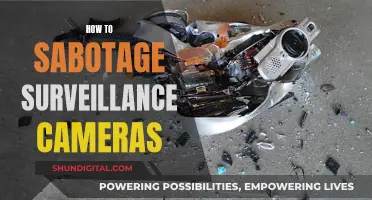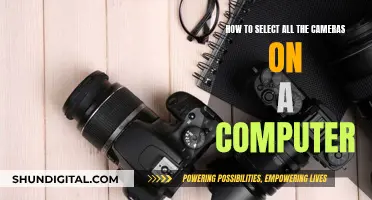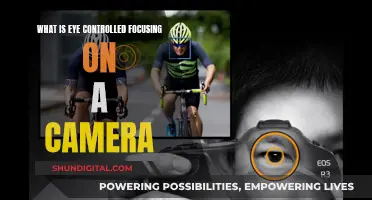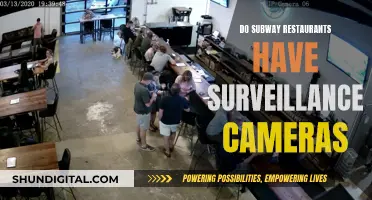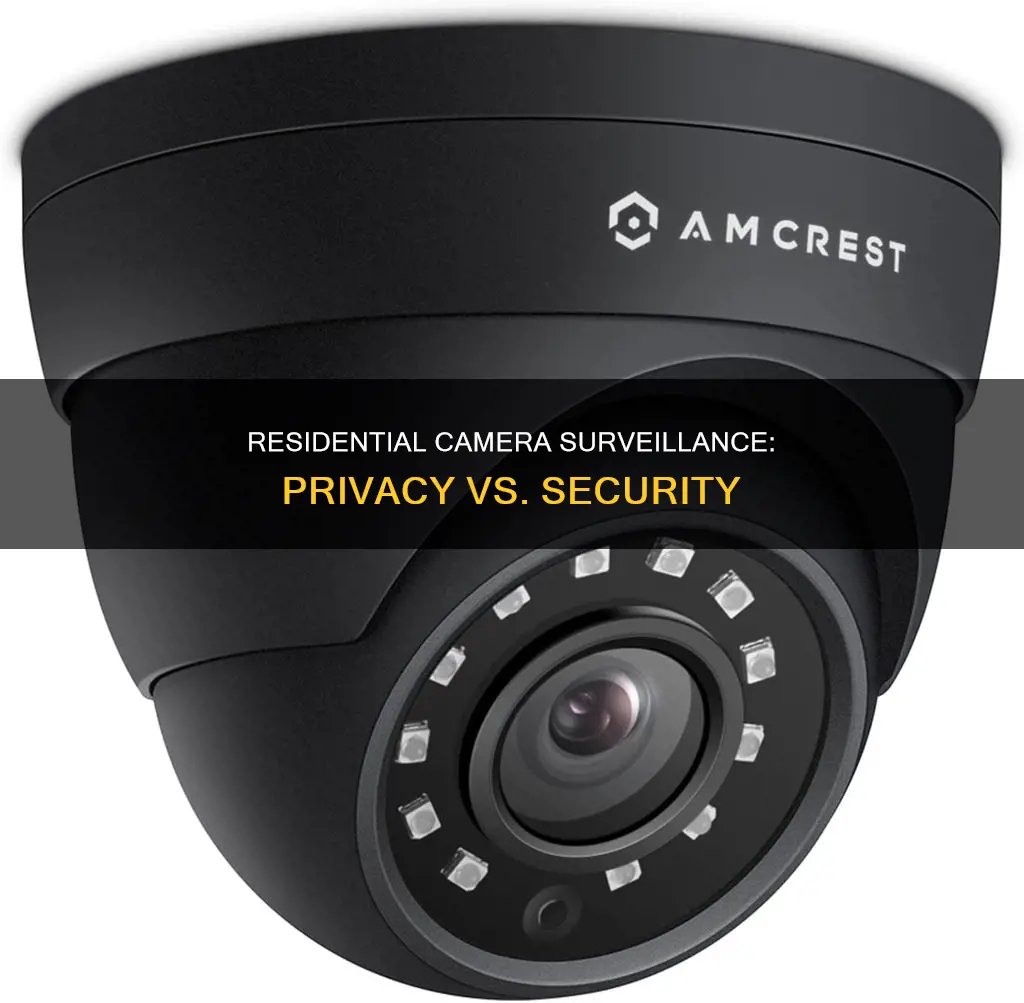
Residential camera surveillance is a popular way to monitor your home and its surroundings. Camera surveillance allows you to see live activity, talk to visitors, and playback videos from your smartphone. The best security cameras detect motion, send instant video clips, and offer features such as night vision, two-way audio, cloud and local storage, and integration with smart home devices.
| Characteristics | Values |
|---|---|
| Legality | In the US, it is generally legal to install a residential security camera and record video. However, there are privacy laws that must be considered. |
| Privacy | It is illegal to record individuals without their consent in areas where there is a reasonable expectation of privacy, such as bathrooms, bedrooms, changing rooms, etc. |
| Consent | One-party consent laws allow recording a conversation with the consent of at least one party. All-party consent laws require the consent of all parties being recorded. |
| Audio Recording | Federal wiretapping laws prohibit audio recording of private conversations without the consent of all parties. |
| Video Recording | Video recording in public places is allowed in all 50 states. |
| State Laws | State laws on security cameras vary; some states have stricter laws than federal regulations. |
What You'll Learn

Consent laws
While there is no specific federal law governing the use of security cameras, there are national laws around privacy and consent that apply to video surveillance. There are also different regulations for recording audio and video footage.
In the US, it is generally legal to install a residential security camera and record video. However, US citizens are guaranteed a reasonable expectation of privacy, which extends to video recording. This means that you cannot record people in private places, such as the bathroom, and you have the right not to be filmed in those areas as well.
For video surveillance, consent laws vary by state. Some states require consent from all parties being recorded, while others may only require consent from one party. It is important to check the specific laws in your state or local area to understand the consent requirements for video surveillance.
Additional Considerations
In addition to consent laws, there are a few other considerations to keep in mind regarding the use of residential camera surveillance:
- It is generally not allowed to direct security cameras inside a neighbour's house or into partially or totally hidden areas of their property.
- While you have more freedom to install cameras inside your own home, there are still privacy expectations for certain areas, such as bathrooms and guest rooms.
- Federal and state wiretap laws restrict the recording of conversations, even in your own home, without the consent of at least one party.
- If you live in a residential subdivision or condominium, it is important to consult your homeowner's association security camera laws to understand any specific rules or restrictions.
- It is generally recommended to avoid installing cameras that point directly into neighbouring properties or private spaces.
How Camera's Autofocus System Uses Red Squares to Focus
You may want to see also

Privacy laws
Privacy is a complex issue when it comes to residential camera surveillance. While there is no specific federal law governing the use of security cameras, there are national laws and individual state laws that address privacy and consent. Here are some key considerations regarding privacy laws in the context of residential camera surveillance:
Expectation of Privacy Laws:
In the United States, individuals are guaranteed a reasonable expectation of privacy, which extends to video recording. This means that recording individuals in private places, such as bathrooms, changing rooms, bedrooms, hotel rooms, etc., is generally prohibited without their consent. This applies not only to your guests but also to your neighbours. For example, if your outdoor cameras can see into your neighbour's windows or private spaces, you may be violating their privacy. Therefore, it is important to ensure that your cameras only capture footage of your own property.
One-Party Consent Laws:
When it comes to audio recording, the law permits recording a conversation, either in person or over the phone, if at least one person involved consents to it. This is known as the "one-party consent" law. However, some states have stricter "all-party consent" laws, requiring the consent of all parties involved in the conversation for the recording to be legal. These states include California, Delaware, Florida, Illinois, and Maryland, among others.
Federal Wiretapping Laws:
The Federal Wiretap Act prohibits the interception or recording of oral communications without the consent of all parties. This applies to security cameras with audio functions, and improper use of such cameras may violate federal law if they are installed in inappropriate areas without proper signage notifying those being recorded.
State-Specific Laws:
While the above considerations provide a general framework, it is important to note that individual states have their own specific regulations regarding security camera laws. For example, California has strict security camera laws, requiring consent for recording in any private setting. In contrast, Georgia allows video surveillance in private and public settings as long as the cameras are in plain sight. Other states, such as Florida, Alabama, and Minnesota, permit hidden video surveillance in non-private settings.
In summary, when installing and using residential camera surveillance, it is crucial to be aware of and comply with the privacy laws at both the federal and state levels. Respecting the privacy rights of others is not only a legal obligation but also essential for maintaining trust and avoiding legal consequences.
Understanding Lorex Camera's Backlight Mode
You may want to see also

Surveillance camera placement
The effectiveness of your home security system relies heavily on the placement of your cameras. Here are some tips and best practices to help you maximise coverage and enhance the security of your property.
Where to Place Cameras
- Front door: Around 34% of burglars enter through the front door, so placing a camera at a second-floor level can help avoid a burglar from knocking out your camera. If you only have one level, you could enclose your front door camera in mesh wiring for protection.
- Back and side doors: Up to 22% of thieves invade houses through the back door, so it's beneficial to have cameras covering these entrances.
- Off-street windows: About 23% of burglars will break into a home through a rear window, away from the view of the street. Pointing a camera at these windows will help keep them safe from thieves.
- Garage and driveway: Garages are common targets for burglars as they are one of the weakest entry points. A camera pointed at your garage and/or driveway will help monitor vehicles, equipment, and anyone entering or leaving.
- Yard: Monitoring the yard will help keep tabs on anyone scoping out your house, and it's also useful for capturing the activities of children, pets, and trespassers.
- Main stairway or hallway: Placing a camera in the main thoroughfares inside your home makes it difficult for someone to move about undetected.
- Common areas: Placing cameras in gathering points like the kitchen or living room is a great way to monitor activity and keep an eye on children, pets, or household help.
Camera Placement Tips
- Visible vs hidden: There is a debate on whether cameras should be visible or hidden. Visible cameras can act as a deterrent, while hidden cameras offer a tactical advantage.
- Durability: Outdoor cameras need to be able to withstand weather conditions and be resistant to dust and debris.
- Height: Place cameras 8 to 10 feet off the ground to capture the most area and make them harder to disable or steal.
- Lighting and glare: Avoid pointing cameras directly at the sun or other bright light sources as this will cause glare and high contrast in your footage. For outdoor cameras, consider getting a camera with HDR (High Dynamic Range).
- Power source: Ensure cameras have access to power sources, either through wired connections or reliable battery solutions.
- Number of cameras: Consider how many cameras may impact your internet speed, especially if they rely on Wi-Fi. You may want to set up a dedicated router for your security cameras.
- Proximity to valuables: Identify and prioritise areas with valuable objects, such as household appliances, electronics, and jewellery.
- Overlap: Ensure there are no blind spots by having overlap in your camera placement.
- Out of reach: Place cameras in locations that are not easily accessible to intruders, and consider protective casings where necessary.
- Test before mounting: Test cameras before permanently mounting them to ensure optimal image quality and lighting, especially at night.
Where Not to Place Cameras
- Neighbour's property: Avoid placing cameras that capture footage on your neighbour's property. Check your state's laws regarding surveillance to ensure compliance.
- Bedrooms and bathrooms: These areas have a warranted expectation of privacy, and there is a risk of hackers accessing sensitive footage if cameras are placed in these spaces.
Legal Considerations
When placing security cameras, it's important to be mindful of legal and privacy boundaries. In the United States, federal law protects homes from unwarranted surveillance. It is illegal to point security cameras at others' properties, and this holds even if the surveillance is unintentional or conducted from a public space. Security camera placement laws vary from state to state, so be sure to research and understand your state's statutes before installing cameras.
Disputing NYC Camera Tickets: Your Comprehensive Guide
You may want to see also

Surveillance camera registration
Surveillance cameras are an effective way to enhance security and protect your home or business. However, it's important to be aware of the legal implications and respect others' privacy rights when installing and using these devices. In this regard, registering your surveillance cameras with your local law enforcement agency can offer several benefits.
Benefits of Registering Your Surveillance Cameras:
- Rapid Identification of Evidence: By registering your cameras, law enforcement agencies can quickly identify nearby cameras that may have captured criminal activity. This helps expedite investigations and increases the chances of apprehending criminals.
- Community Safety: Registering your cameras demonstrates a commitment to community safety. It allows law enforcement to collaborate with residents and business owners, leveraging the power of technology to create a safer neighbourhood.
- Targeted Requests for Footage: When a crime occurs, registered camera locations help police identify relevant footage sources. This targeted approach respects the privacy of registrants and ensures efficient use of investigative resources.
- Voluntary and Confidential: Surveillance camera registration programs are typically voluntary. Your personal information remains confidential and is only used for official purposes. You can also delete your registration at any time.
Legal Considerations for Surveillance Cameras:
- Expectation of Privacy: It is generally legal to install residential security cameras, but individuals are guaranteed a reasonable expectation of privacy. Avoid recording areas where privacy is expected, such as bathrooms, bedrooms, and changing rooms.
- Consent Laws: On a national level, the "one-party consent" law permits recording conversations or phone calls with the consent of at least one party. However, some states have stricter "all-party consent" laws, requiring the consent of all participants.
- State and Local Regulations: While there is no specific federal law governing security cameras, states and local municipalities may have their own regulations. Check with your local city and county guidelines to ensure compliance.
- Invasion of Privacy: Avoid aiming your cameras at your neighbour's property, especially areas that infringe on their privacy, such as bedrooms or bathrooms. Respecting others' privacy rights will help prevent legal issues and maintain positive relationships with those around you.
Example Surveillance Camera Registration Programs:
- Central Marin Police Authority (California): Residents and business owners are encouraged to register their private video surveillance cameras. This helps the police identify nearby cameras that may have captured criminal activity, aiding in investigations and keeping the community safe.
- San Rafael Police Department (California): The SRPD surveillance camera registry allows residents and business owners to voluntarily register their cameras. Investigators can then request surveillance footage from the registered camera owners in the event of a crime.
- San Jose Police Department (California): The Camera Archive & Mapping (CAM) program enables residents and business owners to register the locations of their video surveillance systems. This helps the police identify nearby cameras and enlist community support in collecting video evidence.
In conclusion, registering your surveillance cameras with local law enforcement offers benefits to both the community and individual camera owners. It fosters collaboration between residents and police, leading to a safer neighbourhood for all. By understanding and respecting legal and privacy considerations, you can effectively utilise surveillance cameras to enhance security without infringing on the rights of others.
Disputing Camera Speeding Tickets in New Orleans: Your Rights
You may want to see also

Surveillance camera legality
The legality of surveillance cameras varies depending on the location and the type of camera being used. In the United States, there is a total lack of federal laws prohibiting video surveillance in public spaces, in the workplace, and elsewhere. However, each state has its own laws regarding the use and placement of security cameras, audio recording, and privacy matters.
United States
In most states, surveillance cameras are allowed, but there are some exceptions and circumstances that require monitoring on a case-by-case basis. For example, in some states like New York, Rhode Island, and California, video cameras are prohibited in places where individuals have a reasonable expectation of complete privacy, such as any place where a person may get undressed.
In Delaware and Connecticut, businesses must notify employees and customers if there are video cameras on the property that may violate privacy expectations, such as in bathrooms or changing rooms. Similarly, in Alabama, businesses are required to obtain written consent before recording audio in restrooms, locker rooms, or any other place where individuals have a reasonable expectation of privacy.
Federal laws, such as the Federal Wiretap Act and the Electronic Communications Privacy Act of 1986, also impose restrictions on audio recording. The Federal Wiretap Act prohibits the intentional recording of communications without consent, while the Electronic Communications Privacy Act provides an exception for job-related conversations for employers.
Australia
In Australia, the Privacy Act 1988 applies to Australian Government agencies and organisations with an annual turnover of more than $3 million. Organisations covered by this Act must comply with the Australian Privacy Principles when collecting personal information through surveillance devices. They must inform individuals that their image may be captured and ensure that recorded personal information is secure and properly disposed of when no longer needed.
Additionally, state and territory surveillance and monitoring laws also cover surveillance devices. For example, in New South Wales, the Surveillance Devices Act 2007 regulates the installation, use, maintenance, and retrieval of surveillance devices. Similarly, the Workplace Surveillance Act 2005 requires all employees of an owners corporation to be notified in advance of any audio or visual surveillance.
Overall, the legality of surveillance cameras depends on the specific laws and regulations in the relevant jurisdiction. It is important for individuals and organisations to be aware of these laws to ensure compliance and respect for privacy.
Third-Party Batteries: Safe Power for Your Camera?
You may want to see also
Frequently asked questions
In the US, it is generally legal to install a residential security camera and record video. However, US citizens are guaranteed a reasonable expectation of privacy, which extends to video recording. This means you cannot record people in private places (e.g. bathrooms) and you have the right not to be filmed in those areas as well.
Audio recording laws are stricter and require permission from all parties being intercepted in private conversations. Video recording policies govern "reasonable expectations of privacy" in private places. Public areas have far fewer restrictions.
Yes, as long as your neighbour is only recording activity that happens in public places, like the yard or driveway. Outside areas in public view have no reasonable expectation of privacy, so a recorded image from a public place isn't a violation. However, if your neighbour's camera picks up audio conversations without your consent, this could be a privacy and legal violation.
First, politely ask them to stop and reposition the equipment. If this doesn't work, send a formal notice making it clear that the filming is non-consensual. If this still doesn't work, consulting an attorney may be necessary to compel removal via legal pressure, based on privacy laws.




